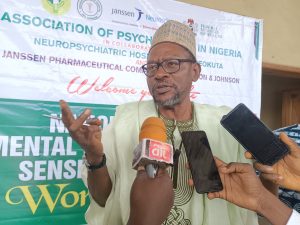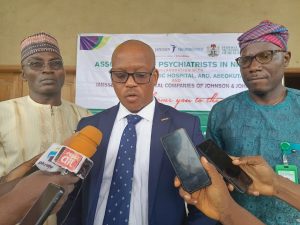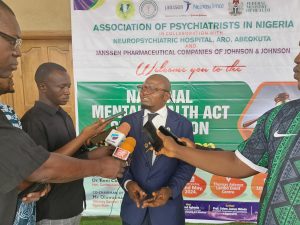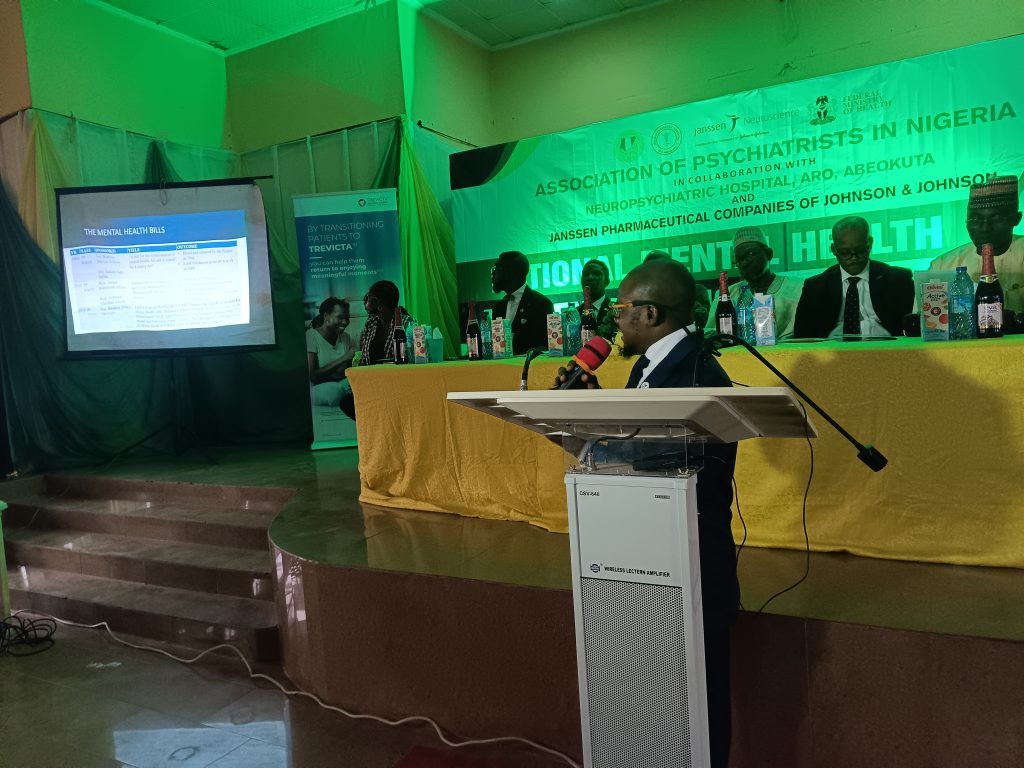Professor Taiwo James Obindo, National President of the Association of Psychiatrists in Nigeria, has called for the full implementation of the new Mental Health Act to replace the outdated Lunacy Act, which treated individuals with mental health conditions inhumanely.
Obindo and other stakeholders spoke at the National Mental Health Act Sensitisation workshop held on Wednesday in Abeokuta, the Ogun State capital.

The event was organised by the Association of Psychiatrists in Nigeria in collaboration with Neuropsychiatric Hospital, Aro, Abeokuta, and Janssen Pharmaceutical Companies of Johnson & Johnson.
The President, while speaking on the Act, recalled the atrocities under the old Lunacy Act, where he said individuals with mental health issues were often treated like trash. Obindo, who is a consultant at Jos University Teaching Hospital, lamented the inhuman treatment given to mental health patients under the old law.
He said, “People were just kept away from others, tied down, chained, and denied any form of care.
The primary aim was merely to separate them from those deemed ‘normal.’ However, the reality is that everyone with a brain is at risk of developing mental health conditions at some point in their lives. Therefore, we must take care of them.”
One of the significant strides of the new Mental Health Act is its emphasis on human rights and the abolition of discriminatory practices. Professor Obindo pointed out that under the Lunacy Act, individuals with mental health conditions could be unjustly dismissed from their jobs or evicted from their homes.
He added that communities could even ostracise them. “Such actions are unacceptable. In the past, properties of those with mental health conditions could be taken over. The new Act ensures that this is no longer possible,” he explained.
The new legislation not only prohibits discrimination but also mandates equal care for mental health conditions as for physical health conditions.
“The care they receive should be almost the same, if not the same, as those with physical health conditions,” Obindo stressed. “The main challenge now is for the federal Ministry of Health to implement the Act.”
While some states like Lagos and Ekiti have already domesticated the Mental Health Act, Professor Obindo insists that implementation must start at the national level.
He said, “If the federal government can implement it effectively, establish the Department of Mental Health Services within the ministry, create the Mental Health Assessment Committee, and set up the mental health fund, then states and local governments will follow suit.
This mental health fund is crucial, as it will provide necessary funding through budgetary allocations, voluntary donations, and contributions from corporate organisations.
This fund aims to ensure that mental health care is adequately resourced and accessible to all who need it.”
Professor Obindo emphasised the comprehensive nature of the new Mental Health Act, which guarantees the rights of individuals with mental health conditions to access quality care without discrimination or stigma.
“Everyone has the right to cooperate and relate well. Consent must be obtained before treatment, and if someone lacks insight into their condition, it must be explained in a way that ensures they receive the right, appropriate, and adequate care.”
Meanwhile, the Provost and Medical Director of Neuropsychiatric Hospital, Aro, Dr. Paul Agboola, has commended the effort of the former President, Muhammadu Buhari, for signing the new Mental Health Act into law.

Agboola said, “There was a lot of effort before this new Mental Health Act was passed into law. Several attempts have been made by the previous arms of the legislative government since 1999, but we thank God that the last legislative sitting was able to get it into law.
The senators and members of the House of Representatives, Senator Yahaya Oloriegbe—the journey started from late Senator Martin Yellow and it was concluded by Senator Yahaya Oloriegbe.”
Speaking on the expectations of the stakeholders after the workshop, Agboola said that there is a plan to domesticate the Act in Ogun State.
He stated that the Act will shape medical practices and also claimed that anybody that runs foul of that Act is liable to face prosecution.
He also sensitized the public that they should know their rights as contained in that Act and also to let state governments and the local government know that certain rights are embedded in that Act.
He claimed that Neuropsychiatric Hospital, the government, and the law enforcement agency have been able to reduce to some level the mortality and morbidity rates.
He urged the public that mental illness can be cured, saying that they don’t need to make sacrifices in the middle of the night.
While reviewing the Act, Dr. Yesir Kareem, a consultant psychiatrist for health security at Aro Abeokuta in Ogun State, highlighted the transformative nature of this Act, which has been over two decades in the making.

He said, “We started this journey in 2003, and by 2023, we finally have an Act that has been accepted by the federal government,” Dr. Kareem stated.
Do you want to share a story with us? Do you want to advertise with us? Do you need publicity for a product, service, or event? Contact us on WhatsApp +2348183319097 Email: platformtimes@gmail.com
We are committed to impactful investigative journalism for human interest and social justice. Your donation will help us tell more stories. Kindly donate any amount HERE




